 Petzlover
Petzlover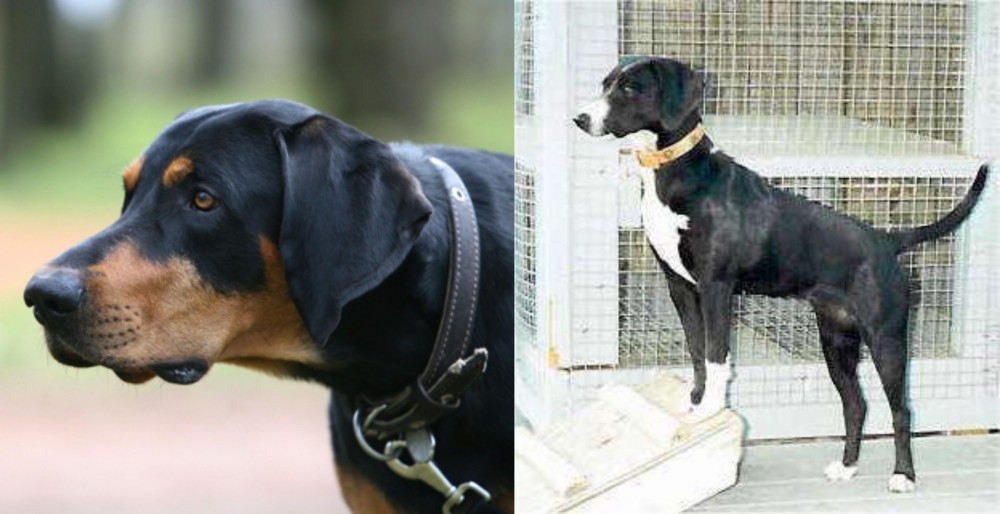 Lithuanian Hound is originated from Lithuania but Stephens Stock is originated from United States. Lithuanian Hound may grow 11 cm / 5 inches higher than Stephens Stock. Lithuanian Hound may weigh 26 kg / 57 pounds lesser than Stephens Stock. Both Lithuanian Hound and Stephens Stock has same life span. Lithuanian Hound may have more litter size than Stephens Stock. Both Lithuanian Hound and Stephens Stock requires Low Maintenance.
Lithuanian Hound is originated from Lithuania but Stephens Stock is originated from United States. Lithuanian Hound may grow 11 cm / 5 inches higher than Stephens Stock. Lithuanian Hound may weigh 26 kg / 57 pounds lesser than Stephens Stock. Both Lithuanian Hound and Stephens Stock has same life span. Lithuanian Hound may have more litter size than Stephens Stock. Both Lithuanian Hound and Stephens Stock requires Low Maintenance.
 This attractive dog hails from Lithuania.This is an old dog breed that has been used as a hunting dog.
This attractive dog hails from Lithuania.This is an old dog breed that has been used as a hunting dog.
It is believed that this dog dates way back to the 16th century and that it was developed from the mixing of hound breeds – Bloodhounds, Beagles, Polish Hounds and Russian Hounds.
The numbers of the dogs decreased and in the late 1970s, the Lithuanian Cytological Council developed a kennel facility for restoring Lithuanian Hound numbers, and a standard was also written. This breed is rare and is not usually found outside the Republic of Lithuania.
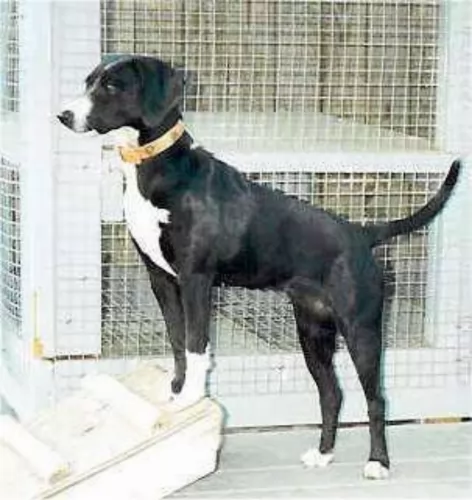 The Stephens Stock is a member if the Cur dog breeds. They are a scent hound bred in southeastern Kentucky by the Stephen’s family. For generations the dogs were simply known as the “little black dog”. The Cur breeds are dogs with a mixture of ancestry and the Stephens Cur is no different. However, the name Cur now means a working dog from the South in the United States. They were known as hunting and guard dogs, chasing wild boar, squirrel and raccoon. They were also called the Mountain Curs throughout Kentucky, Tennessee and Virginia.
The Stephens Stock is a member if the Cur dog breeds. They are a scent hound bred in southeastern Kentucky by the Stephen’s family. For generations the dogs were simply known as the “little black dog”. The Cur breeds are dogs with a mixture of ancestry and the Stephens Cur is no different. However, the name Cur now means a working dog from the South in the United States. They were known as hunting and guard dogs, chasing wild boar, squirrel and raccoon. They were also called the Mountain Curs throughout Kentucky, Tennessee and Virginia.
These mountain working dogs came close to extinction by the 1940’s but four separate breeders set out to save the Mountain Curs. They were the founders of the Mountain Cur Club and involved Woody Huntsman of Kentucky, Carl McConnel of Virginia, Dewey Ledbetter of Virginia and of course Hugh Stephens of Kentucky. Later the name of the club was changed to the Original Mountain Cur Breeders Association or OMCBA. The Mountain View Cur, the Treeing Cur and the Stephens Stock Cur were the results of their efforts.
In the 1970’s Stephen’s decided that his Cur was different from the original Mountain Curs and should be a separate breed. He formed the Stephen’s Breeders Association and the breed was recognized as distinct from other Curs. However, it was not recognized by the UKC (United Kennel Club) until 1998.
 The Lithuanian Hound is a medium-sized dog which stands at between 53 - 61 cm in height and weighs between 27 to 32kg.
The Lithuanian Hound is a medium-sized dog which stands at between 53 - 61 cm in height and weighs between 27 to 32kg.
He is a well proportioned, sturdy dog, heavily boned and muscular with straight, strong legs. The coat of the dog is short, smooth and essentially black with some tan markings. He has a large head, bright brown eyes, black nose, deep, broad chest and long, floppy ears with rounded tips. The tail of the dog is long and held low.
The attractive Lithuanian Hound is a sighthound known for his hunting skills which he does with great determination and stamina.
He loves going on the hunt and forms a strong bond with his hunting handler, being reserved with people he doesn’t know. Lithuanian Hounds are generally easy to train and are eager to please. Training and socialization will be easy with a dog like this as he is intelligent and keen to please.They respond well to an owner who is confident, fair, patient and consistent.
His attachment to the family makes him a good watchdog too. After the hunt, he becomes an amicable, friendly, loving dog, loving to spend a quiet evening with his human family. He is energetic and doesn’t take too kindly to sitting around for long periods. He loves to be on the go and will require a good deal of vigorous exercise.
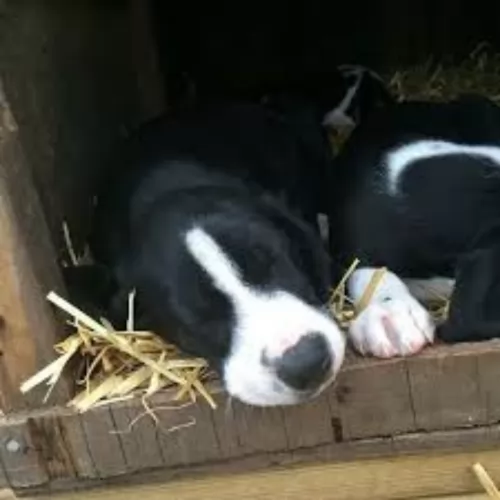 The Stephens Stock Cur is a breed of medium size, dark dogs – either very dark grey or black. Their heads are domed, and the muzzle is short with dark eyes. The breed’s chest is broad and deep with a neck of medium length and either a rough or smooth coat. They are smaller than the other Curs like the Black Mouth Cur or the Mountain View Cur.
The Stephens Stock Cur is a breed of medium size, dark dogs – either very dark grey or black. Their heads are domed, and the muzzle is short with dark eyes. The breed’s chest is broad and deep with a neck of medium length and either a rough or smooth coat. They are smaller than the other Curs like the Black Mouth Cur or the Mountain View Cur.
They are strong and capable of treeing their prey. Their body is longer than it is high, and they have powerful and long legs. Their appearance is sleek and elegant. The nose is dark and square, and their stance is alert and that of a watchdog. This is an athletic hunting dog that is aggressive in the field and chilled at home.
 The Lithuanian Hound has always been a dog used for hunting, so he wants to belong to a family where hunting is still practiced or where there is a large garden.
The Lithuanian Hound has always been a dog used for hunting, so he wants to belong to a family where hunting is still practiced or where there is a large garden.
He is smart and easy to train, and what’s more he’s a healthy, robust, low maintenance dog. He’s an amicable dog too, calm, independent and confident, and will make a splendid companion to his human family. He gets on well with children and is willing to share his space with other dogs too.
By choosing the Lithuanian Hound, you’re allowing a wonderful canine friend into your home and heart.
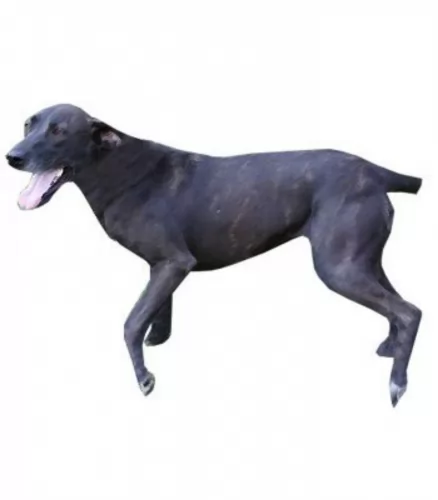 1. Children friendliness - They are tenacious on the hunt but once at home they love children.
1. Children friendliness - They are tenacious on the hunt but once at home they love children.
3.Adaptability They are adaptable if you can get them the exercise, they need every day. They won’t do well in an apartment without going to play and run somewhere else every day.
 Lithuanian Hounds can reach 12 – 14 years of age when they’re loved and well cared for. You won’t find many medical problems with this robust dog breed, but it pays to know some of the more common dog illnesses.
Lithuanian Hounds can reach 12 – 14 years of age when they’re loved and well cared for. You won’t find many medical problems with this robust dog breed, but it pays to know some of the more common dog illnesses.
This is a genetic condition that affects the hips and which can lead to painful arthritis. Dogs prone to hip and elbow dysplasia always benefit by avoiding obesity.
Deep chested dogs are more prone to Bloat, occurring when gas builds up in the stomach and can’t escape. This is a life threatening illness and immediate medical attention will be required.
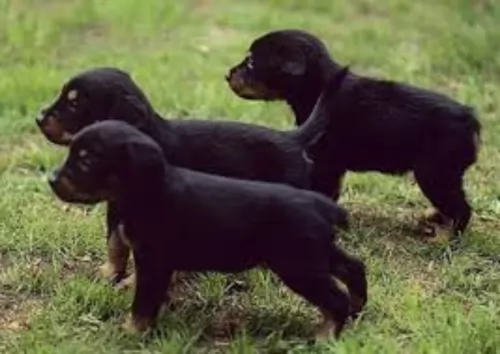 The Stephens Stock Cur is a fairly healthy breed, fairly isolated in the hills and mountains of Kentucky and Tennessee. They are prone to a few health conditions but there are no genetic and breed specific issues.
The Stephens Stock Cur is a fairly healthy breed, fairly isolated in the hills and mountains of Kentucky and Tennessee. They are prone to a few health conditions but there are no genetic and breed specific issues.
• Ear and Eye Infections. Keep them clean and keep debris out of both ears and eyes after hunting.
 This energetic dog is going to want a lot of exercise as he has always been a hunting dog. While a long, brisk walk will be excellent for him, he will want more activity than that. He’ll want to be included in all your activities – walks, hikes, camping trips and swimming.
This energetic dog is going to want a lot of exercise as he has always been a hunting dog. While a long, brisk walk will be excellent for him, he will want more activity than that. He’ll want to be included in all your activities – walks, hikes, camping trips and swimming.
A big positive with the beautiful, sleek Lithuanian Hound is that he is looked upon as a low maintenance dog. The short coat will require a good brush down twice a week.
He sheds a couple of times during the year. He’s the kind of dog who thrives on these grooming sessions and it’s a time to check him over for ticks and fleas as well as for odd lumps.
Look inside his ears too, particularly since he is a floppy eared dog. Open his mouth too and keep his teeth brushed and clean. There is special canine toothpaste and toothbrush for this purpose. Never try to use human toothpaste as it can be toxic for your dog.
There are a number of things to consider when it comes to feeding your dog, but it goes without saying that the best, most nutritious food will ensure health and longevity.
If you feed your pet commercially manufactured pet food, use the feeding guidelines found on the packaging labelling. With any new food types you give your dog, keep an eye on him for reactions.
Your dog’s metabolism and energy levels as well as his age will determine how much to feed him.
There are many excellent dog foods available – choose an excellent one and make sure to feed your dog some tasty, nutritious home-made food too.
You can’t go wrong with some cooked chicken, brown rice or pasta and some raw and cooked vegetables. Chop up and add to his dry kibble from time to time and he’ll be happy and healthy. Raw meat is expensive but try and include some every now and then as it contributes to allergy-free skins, bright eyes, shiny coats, wet noses and wagging tails.
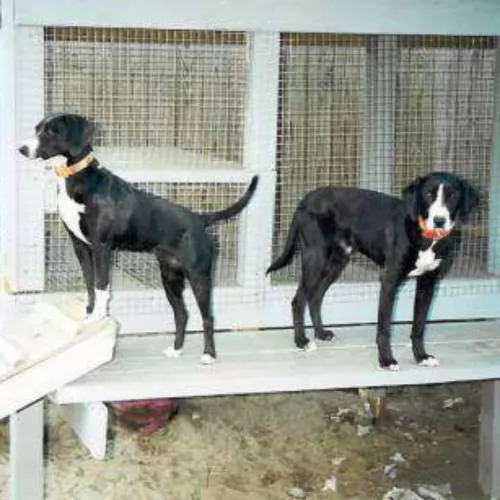 1.Feeding the puppy -Feed puppies a quality food desired for medium breed, high energy dogs. Puppies should eat 3 times a day about a total of 2 cups.
1.Feeding the puppy -Feed puppies a quality food desired for medium breed, high energy dogs. Puppies should eat 3 times a day about a total of 2 cups.
2.Feeding the adult Feed a high quality dog food with plenty of protein and designed for medium size dogs. Feed a total of 3 cups over 2 meals a day.
4. Games and Exercises – This is a very high energy treeing hunting dog with remarkable speed and agility. They need exercise – both physical and mental. One walk a day will not do it for these dogs. Have a fenced in yard or take them to organized activities like field trials, agility, flyball, hunting, search and rescue or barn hunt. They love to hunt with their people.